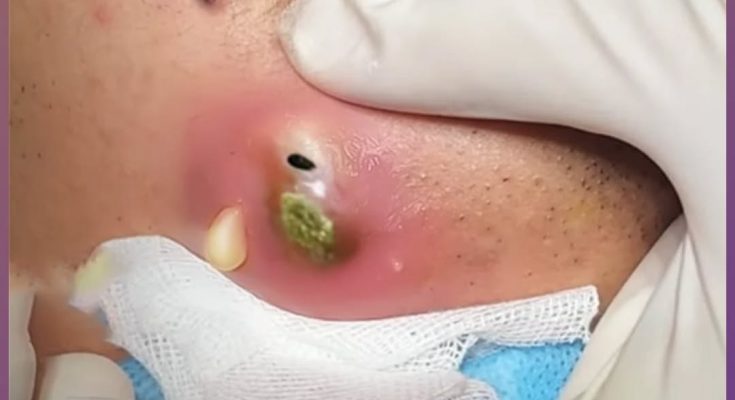Skin infections can vary in severity, ranging from mild pimples to serious abscesses that require medical intervention. The image above shows a patient with multiple comedones (blackheads and whiteheads) along with a large, inflamed abscess on the cheek. This highlights how untreated acne or bacterial infections can progress into painful and potentially dangerous conditions.
What Is Happening in the Image?
-
Comedones (Blackheads/Whiteheads): The small dark and light spots visible on the upper cheek are clogged pores filled with sebum, dead skin, and bacteria.
-
Abscess/Boil Formation: The lower cheek shows a red, swollen lump filled with pus and necrotic tissue (greenish area), which is a sign of a bacterial infection. The skin is inflamed and painful, indicating an advanced infection.
Causes of Severe Facial Infections
-
Bacterial Infection: Most commonly caused by Staphylococcus aureus, which can enter clogged pores or small cuts.
-
Poor Hygiene: Not cleaning the skin properly can allow dirt and oil buildup.
-
Immune Response: When bacteria grow inside blocked pores, the immune system reacts aggressively, leading to swelling, redness, and pus.
-
Underlying Skin Conditions: Conditions like cystic acne or hidradenitis suppurativa may worsen infections.
Symptoms to Watch For
-
Redness and swelling
-
Severe pain around the lump
-
Yellow or green pus discharge
-
Warmth over the infected area
-
Fever or swollen lymph nodes in severe cases
Treatment Options
-
Medical Drainage: Large abscesses often require incision and drainage by a doctor under sterile conditions.
-
Antibiotics: Oral or topical antibiotics may be prescribed to fight infection.
-
Proper Wound Care: Cleaning and dressing the wound prevents reinfection.
-
Skincare Routine: Regular cleansing, exfoliation, and avoiding squeezing pimples reduces the risk of infections.
-
Medical Follow-up: In severe cases, a dermatologist’s ongoing care is essential.
Prevention Tips
-
Keep skin clean by washing twice daily with a gentle cleanser.
-
Avoid picking or squeezing pimples, as this can spread bacteria deeper into the skin.
-
Use non-comedogenic skincare products to prevent pore blockages.
-
Strengthen immunity through a balanced diet, hydration, and adequate sleep.
-
Seek medical help early if a pimple becomes unusually swollen or painful.
👉 Bottom Line: The image demonstrates how untreated acne and infections can escalate into a severe abscess requiring professional care. Early treatment and proper skincare can prevent such painful and risky conditions.

